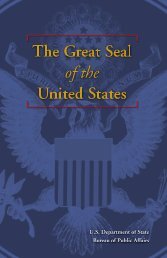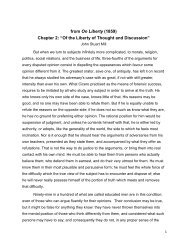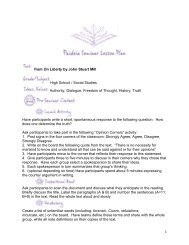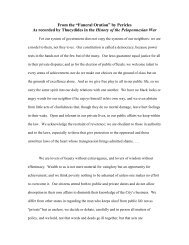Rousseau_contrat-social
Create successful ePaper yourself
Turn your PDF publications into a flip-book with our unique Google optimized e-Paper software.
I have tried to follow in inquiring how the freest and most powerful<br />
people on earth exercised its supreme power.<br />
After the foundation of Rome, the new-born republic, that is, the army<br />
of its founder, composed of Albans, Sabines and foreigners, was divided<br />
into three classes, which, from this division, took the name of tribes.<br />
Each of these tribes was subdivided into ten curiæ, and each curia into<br />
decuriæ, headed by leaders called curiones and decuriones.<br />
Besides this, out of each tribe was taken a body of one hundred Equites<br />
or Knights, called a century, which shows that these divisions, being<br />
unnecessary in a town, were at first merely military. But an instinct<br />
for greatness seems to have led the little township of Rome to provide<br />
itself in advance with a political system suitable for the capital of<br />
the world.<br />
Out of this original division an awkward situation soon arose. The<br />
tribes of the Albans (Ramnenses) and the Sabines (Tatienses) remained<br />
always in the same condition, while that of the foreigners (Luceres)<br />
continually grew as more and more foreigners came to live at Rome, so<br />
that it soon surpassed the others in strength. Servius remedied this<br />
dangerous fault by changing the principle of cleavage, and substituting<br />
for the racial division, which he abolished, a new one based on the<br />
quarter of the town inhabited by each tribe. Instead of three tribes he<br />
created four, each occupying and named after one of the hills of Rome.<br />
Thus, while redressing the inequality of the moment, he also provided<br />
for the future; and in order that the division might be one of persons<br />
as well as localities, he forbade the inhabitants of one quarter to<br />
migrate to another, and so prevented the mingling of the races.<br />
He also doubled the three old centuries of Knights and added twelve<br />
more, still keeping the old names, and by this simple and prudent<br />
method, succeeded in making a distinction between the body of Knights,<br />
and the people, without a murmur from the latter.<br />
To the four urban tribes Servius added fifteen others called rural<br />
tribes, because they consisted of those who lived in the country,<br />
88











